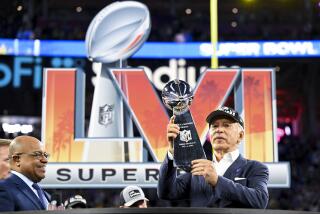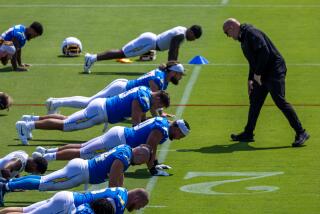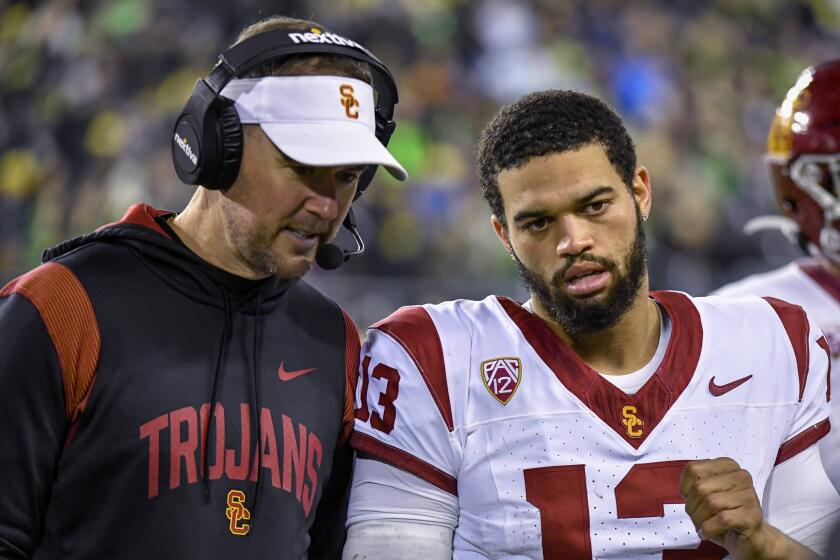Column: St. Louis Rams perhaps step toward L.A., and that raises questions

For an under-the-radar billionaire whose nickname is Silent Stan, the owner of the St. Louis Rams just made his voice heard loud and clear.
Stan Kroenke has joined forces with the owners of the Hollywood Park site, and they plan to build a massive development on their nearly 300 acres of combined land in Inglewood — the centerpiece being an 80,000-seat football stadium that could pave the way for the NFL’s long-awaited return to the Los Angeles market.
So is the end of this meandering, 20-year, NFL-to-L.A. odyssey within sight? What hurdles remain? And has one of the league’s most head-scratching conundrums — the irreconcilable differences between the nation’s No. 1 sport and No. 2 market — become more like a game of checkers than one of three-dimensional chess?
Some questions and answers about the situation:
Does this mean the Rams are moving back to L.A.?
Not necessarily, but it’s a big step in that direction. This is the first time in two decades that an existing NFL owner has had control of sufficient land for a stadium and parking in the region. He has the ability and desire to get out of his lease in St. Louis, and, as the league’s second-richest owner, the wherewithal to do almost anything he wants.
Could it also be just another leverage play to get a city, in this case St. Louis, to pay up?
Leverage has always been a component in L.A. negotiations, but Kroenke is no bluffer. He’s taking a big risk announcing his intentions this early, especially when the league has ruled out any team’s relocating in 2015. ‘Tis the season for the Rams to start renewing season-ticket holders, and if St. Louis fans are convinced the team is leaving, those open seats could be even more bountiful next fall.
On the flip side, the Rams would have a year to rev up the L.A. fan base for the team’s arrival.
How soon could the Rams move here?
Unless a deal emerges that convinces Kroenke to stay in St. Louis, 2016 is the target date for relocation. The best-case scenario would have the Rams in a temporary venue, probably the Coliseum or Rose Bowl, with a new stadium ready to go in 2018.
What about the San Diego Chargers and Oakland Raiders? Aren’t those teams considering relocation too?
Those are the other shoes that could drop. Both of those teams can get out of their leases too, and they’re similarly unhappy with their situations. Think of this as musical chairs, with three participants and two chairs. The Rams just turned off the music, and in doing so cranked up the sense of urgency with all three teams to find stadium solutions.
The Raiders are more amenable to sharing a stadium. But this move by the Rams could force the Chargers to take another long look at the Farmers Field concept — or face getting shut out entirely.
Does the Farmers Field proposal still have a pulse?
Absolutely. The NFL has been working closely with Anschutz Entertainment Group on that downtown deal. The league is insistent on controlling the L.A. market, and that means having multiple stadium possibilities, then letting the best option win.
Seeing as the NFL likes competition, isn’t the potential of three teams vying for two spots a positive?
On the contrary, it’s a problem. If you have three teams apply for relocation and only two spots, one of those teams “loses.” That’s not good for that club, and it’s not good for the NFL.
The loser would have to skulk back to the city it left, tail between its legs, and with zero leverage to get a stadium done there because the L.A. vacancies are gone. Good luck selling season tickets.
That means the league will turn up the heat on all three teams to exhaust every stadium option in their current cities, turn over every stone before throwing up their hands in frustration and packing the moving vans.
How about constructing two different venues?
It’s hard enough to get one stadium built, let alone two. The past two decades are a testament to that.
More to Read
Go beyond the scoreboard
Get the latest on L.A.'s teams in the daily Sports Report newsletter.
You may occasionally receive promotional content from the Los Angeles Times.











